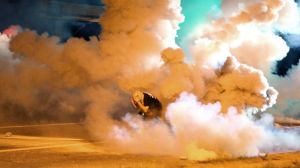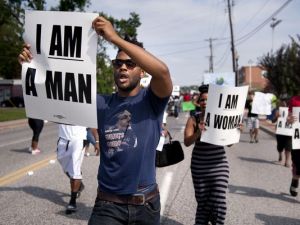As I grew up, I was able to complain when things weren’t fair. I could tell my parents or some other figure of authority, and leave it to them to satisfy my expectation for fairness and order and happiness. Not everyone experiences the entitlement I was raised to demand. An example of this can be found today in Ferguson, Missouri. “Fair” is not a reality in this racially divided community, where although 67% of the population is black, the police force is 83% white. In addition, “five of the six council members and the mayor are all white.” (Capehart)
The authority figures — the government and the police force — who I would expect to stick up for me play the opposite role in Ferguson. NPR observed in a recent report that “To understand some of the distrust of police that has fueled protests in Ferguson, Mo., consider this: In 2013, the municipal court in Ferguson — a city of 21,135 people — issued 32,975 arrest warrants for nonviolent offenses, mostly driving violations…” Thomas Harvey, who started an organization to provide legal services to the poor in the St. Louis region and is the lead author of the report, says residents, especially in Ferguson, have come to see the use of fines and fees as a way for courts to collect money from residents who are often the least able to pay.” (Shapiro)
These systems are the root of unfairness and fear in Ferguson and similar communities. Unfairness which instills a sense of hopelessness and anger into the populace, and fear that heightens survival instincts. Ferguson may be located in the land of the free, but the people are not.
As even our ambiguous understanding of the Michael Brown shooting shows, he eventually chose flight when confronted by a police officer. However, the conversations about racism and police violence in America have eclipsed the event that sparked them. At this point, the most important aspect of the Mike Brown shooting are the issues that it has brought to light, all across America and the world. Although we all hold differing views as to what exactly this shooting indicated, it is unjustifiable to write off all of the issues that the incident has exposed.
However, what is justified, is the anger that those in Ferguson feel, not only as a result of Michael Brown’s death, or the disproportionate murder of other black males over the years, but in response to the marginalization and silencing that they have been subject to for generations. We may not condone the violence that has become a method of protesters in Ferguson and elsewhere, but the lifetimes of violence and fear and few opportunities that is the reality for most in Ferguson is far more despicable than the methods they chose to express their anger. Even so, the vast majority of protests in Ferguson were nonviolent, a fact conveniently overlooked by most media outlets.
If anything, the Michael Brown shooting has given the nation a chance to question our own prejudices and privileges, and finally an opportunity for those in Ferguson to be heard. But how many times do we need to question the institutions that allowed Michael Brown to be killed and left in the street? That let 12-year-old Tamir Rice be shot in a playground for holding a toy gun? The nation should not only be outraged by these murders, and perhaps by the failure to indict Darren Wilson, but also by the fact that the lives these boys led before were cut short, and the lives and systematic oppression that people of color all across America will continue to endure. If black lives matter, if human lives matter, we should start taking an interest in them long before they are over.
Sources:
Capehart, Jonathan. “Three troubling things exposed by the Ferguson polics shooting of Michael Brown.” The Washington Post. The Washington Post, September 5, 2014. Web. 12 December, 2014.
Shapiro, Joseph. “In Ferguson, Court Fines and Fees Fuel Anger.” National Public Radio. National Public Radio, 25 August, 2014. Web. 12 December, 2014.



